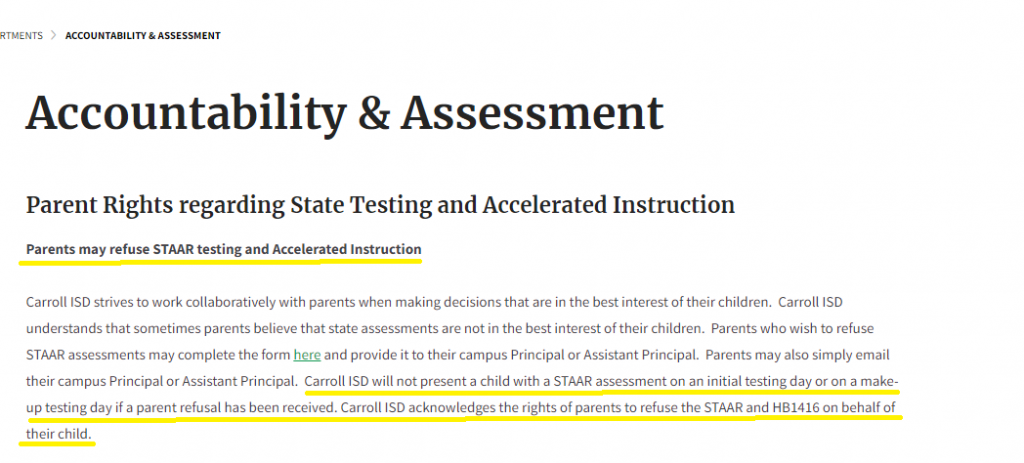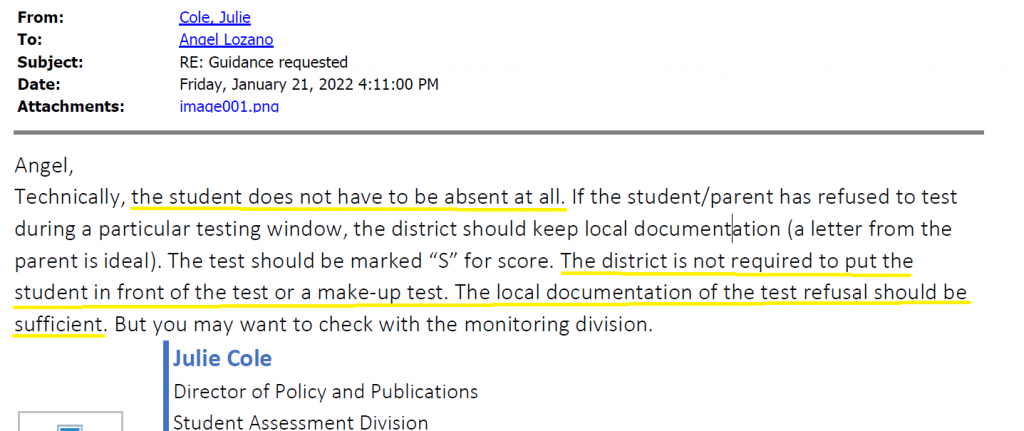Carroll ISD Formally Recognizes Parental Refusal Rights
This is a big one folks! To be clear: it doesn’t change the law or TEA positions. This is simply an almost word for word regurgitation of what the TEA has been permitting for three years now. It does not break new ground. It communicates existing guidance and options. But it is a BIG ONE!
Why is it big? Because it is in writing, publicly available, and set out in clear, straightforward language. It is an example of how EVERY DISTRICT IN TEXAS should engage with its parents. And it comes from a district that ordinarily is a big beneficiary of the STAAR assessment program. Carroll ISD is a high income, high achieving, suburban school district. Across the district, campuses are awarded accountability ratings of “A.” They boast of great quality in public schools. The district has the facilities and resources that many districts can only imagine. It has active, engaged parents and an engaged school board. And it just so happens to have a school board president who has had enough of STAAR madness. After nearly getting a resolution passed to refuse state dictated field testing (the vote failed 3-3), the district decided to face parental pushback on STAAR head on.
So how did they address parents who have concerns over STAAR assessment and want to opt out? No threats. No intimidation. No lies. Just the plain truth — and they put it right on their website.
Parents may refuse STAAR testing and Accelerated Instruction
This is the opening to the district’s departmental accountability page! And it is true. We’ve known it is true for over a decade and for the last three years, the TEA has been telling districts that they don’t have to fight with parents, that they don’t have to threaten parents, that they don’t have to try to trick kids to disobey their parents just to create assessment data. And while a number of districts have, often after contentious discussions with parents, started to employ this approach, it is still a moving target in many districts. In part, this is because the TEA has failed to give clear guidance. Instead of spelling it out like Carroll ISD does, the TEA says things like “the district must offer the child the opportunity to be assessed. What that looks like may vary district to district.” The answers are found in various unpublished emails and response logs, only available by public information request. Only when asked directly will the TEA directly tell a district that they don’t have to put an assessment in front of the kid or that they can accept parental refusal and submit the assessment from scoring based only on the parental refusal letter.
But right on the Carroll ISD website is the pure unadulterated truth for parents:
After giving notice (either by email, letter or district created form) the district will honor and respect the parental refusal:
- Carroll ISD will not present a child with a STAAR assessment on an initial testing day or on a make-up testing day if a parent refusal has been received.
- Carroll ISD acknowledges the rights of parents to refuse the STAAR and HB1416 on behalf of their child.
- When a parent refuses STAAR assessments for their child, the child will receive a raw score of zero.
- STAAR assessment score is not used to promote a child to the next grade level.
- The zero does not impact your child’s GPA.
- Carroll ISD is not allowed to encourage refusal of STAAR or of HB1416 Accelerated Instruction.
- CISD will always support parents in their educational choices for their children.
How different is this approach from many of the district responses we see? How straightforward is this approach? No need to threaten, lie or create fake consequences. And on high school issues, even though the district refusal form is not fully accurate, again, the webpage talks about substitute assessments and links parents to the commissioner’s substitute assessments that are available to meet graduation requirements.
TPERN congratulates the Carroll ISD parents who have engaged their district to bring about this change. But we particularly want to honor and appreciate the district leadership, both administrative and elected, that have decided that they will not be defined by STAAR, that they will not place themselves above parents in determining what is the best educational approach for a child, and that they will deal with their parents honestly and openly in presenting the true options available to parents and districts in responding to state assessment requirements.



